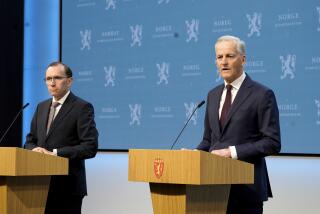West Europeans Agree to Establish Ties With Baltics : Diplomacy: The 12-nation EC announces formal recognition. Several countries prepare to set up embassies.
- Share via
BRUSSELS — Picking up where they left off in 1940 after the disputed Soviet annexation of Lithuania, Latvia and Estonia, the 12-nation European Community agreed Tuesday “to establish diplomatic relations with the Baltic states without delay.”
Formal recognition of the sovereignty and independence of the three Baltic states by the European Community was announced at a meeting of foreign ministers here.
Several of the European countries, including France and Germany, announced visits to the Baltics later this week to establish embassies. Baltic foreign ministers were invited to attend a special meeting of European leaders next week, probably in Brussels.
But sensitive to the huge ethnic and nationalist political pressures in the region, the European leaders cautioned that recognition of the Baltic states did not mean that other independence-seeking Soviet republics could hope for similar treatment.
Regarding the other Soviet republics that have declared their independence and seek European recognition, Dutch Foreign Minister Hans van den Broeck said: “Our position is that they should all be judged on their own merits. Case by case, taking into account the principles of international law.”
Among the 12 community nations, only Spain and the Netherlands had ever officially recognized the Baltics as part of the Soviet Union since they fell under Soviet control after a disputed 1940 pact between Adolf Hitler and Josef Stalin.
Germany took special pains Tuesday to recognize its past role with the Baltics. But the Europeans, at the same time, carefully stressed that the recognition was a “restoration” of existing policy--put on ice by what they considered to be 51 years of illegal Soviet administration--not a new acknowledgement of Baltic rights.
“Everyone is operating on the assumption that the three Baltic states are different from the other Soviet republics,” explained British Foreign Secretary Douglas Hurd. “What we have done with the Baltics does not carry any indication as to how we would handle other republics of the Soviet Union or, indeed, of Yugoslavia.”
Experts with the European Community offices in Brussels have estimated that the short-term economic requirements of the Baltic states are between $2.5 billion and $3 billion. But the foreign ministers put off the question of aid until formal diplomatic relations and economic links can be established.
Noted one official: “These are countries that don’t even have their own currency. Two-thirds of their trade is still with the Soviet Union.” The Europeans strongly encouraged the Baltic leaders to seek economic agreements with the Soviet Union.
“Recognition is not conditional,” said Hurd, “but there is a clear understanding that they have a lot to clear up with the center.”
The underlying fear among Europeans at the Brussels meeting is that the Baltics’ recognition will cause a flood of new petitions for recognition from the already chaotic ethnic and nationalistic terrain of Eastern Europe.
Clearly fresh in the minds of the European foreign ministers was the frightening situation in Yugoslavia, where Serbian and Croatian nationalists are involved in a bitter civil war. The Serb-Croat conflict is mainly centered on the existence of pockets of Serbian populations in Croatian territory.
The plight of the Serbian minorities has been the rallying call for Serbian nationalists and, many contend, the Serbian-dominated national army.
But as Western European leaders acknowledged here Tuesday, similarly volatile conditions also exist in the Soviet Union, where large Russian minorities can be found in most republics. In the Baltic states of Latvia and Estonia, for example, Russians account for more one-third of the population. In Lithuania, Russians are 9% of the population.
In the Ukraine, however, where Ukrainian nationalists have also announced their independence, the Russian population is more than 10 million--roughly 20% of the republic.
A major fear is that independence would isolate and alienate these Russian minority populations, which then would turn to the Russian Federation and its leader, Boris N. Yeltsin, for protection and support.
Meantime, in Germany, the government recognized the breakaway Baltics in a guarded manner but expressed concern about the control of nuclear weapons if the Soviet Union should splinter.
Foreign Minister Hans-Dietrich Genscher told the visiting foreign ministers of Latvia, Estonia and Lithuania in Bonn that Germany is “aware of its historical responsibility towards the Baltic states. Hitler’s Germany, through the Hitler-Stalin pact . . . helped destroy the sovereignty of the Baltic states and incorporate them into the Soviet Union against their will.”
At a Bonn press conference, the three foreign ministers welcomed Germany’s promises of economic, cultural and technical exchanges.
International recognition of the Baltic states “is regarded . . . as a goodwill sign, as liquidation of the last consequences of World War II, and is a process which would lead these three European states back into Europe, into European political and economic structures,” said Latvia’s foreign minister, Janis Jurkans.
A Foreign Ministry spokesman said Germany wanted to announce its recognition of the Baltics ahead of the European Community “because of the special responsibility Germany has as a result of the Hitler-Stalin pact.”
In a radio interview, Genscher said Germany “hopes that the republics in the Soviet Union who want to stay together will find a new inner stability. The concern that a collapse of the Soviet Union will result in different possessors of atomic weapons is a justifiable concern, and one that we share.”
He called for a Western initiative to remove these weapons from both East and West.
“Then the strategic systems still remain, but they are far and away easier to control and the danger of proliferation, or of an expansion of nuclear weapon holders, is surely lower,” he said.
Tempest reported from Brussels; Jones reported from Berlin.
More to Read
Sign up for Essential California
The most important California stories and recommendations in your inbox every morning.
You may occasionally receive promotional content from the Los Angeles Times.













